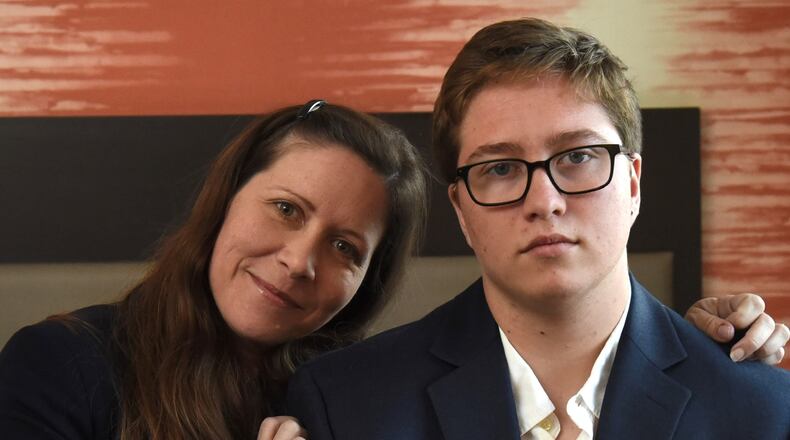The Biden Administration is asking the federal appeals court in Atlanta to strike down a high school’s policy that forbids transgender students from using bathrooms that correspond with their gender identities.
During oral arguments Tuesday, Justice Department lawyer Elizabeth Hecker said the policy violates Title IX, the 1972 federal civil rights law that protects students from sex discrimination.
Appearing before the full 11th U.S. Circuit Court of Appeals, Hecker was allowed time to argue with Tara Borelli, a lawyer with Lambda Legal. Borelli represents Andrew Adams, a transgender man who filed suit against the policy in 2017 when he attended Nease High School in Ponte Vedra Beach, Florida.
The policy is harmful to Adams, Hecker told the court’s 11 judges. “It treats him differently, as if he’s not a boy.”
The closely watched case will set a precedent for the three states under the 11th Circuit’s jurisdiction: Georgia, Florida and Alabama. In legal briefs, 20 states asked the court to overturn the school board’s policy, while 17 states, including Georgia, asked the court to uphold it.
This is not the first time the case is before the 11th CIrcuit. In recent opinions, a three judge panel, by a 2-1 vote, struck down the policy. But Chief Judge Bill Pryor, in dissent, said there is nothing unlawful under the Constitution or federal law about a policy that separates school bathrooms on the basis of sex.
In August, the full 11th Circuit vacated the panel’s decision and decided to consider the case anew. With seven judges appointed by Republican presidents, including six by former President Donald Trump, the conservative court appears poised to let the school board’s policy stand.
If the 11th Circuit does so, its decision will be an outlier. Appeals courts in Richmond and Chicago have issued opinions allowing transgender students to use common restrooms matching their identity, and the appeals court in Cincinnati issued a similar decision. Also, appeals courts in San Francisco and Philadelphia have rejected challenges by cisgender students who claimed that having to share restrooms with transgender students violated their right to privacy.
The Florida board’s policy says a student can only use the bathroom corresponding to the gender they selected when they enrolled into the school system. Because Adams identified himself as a girl when he enrolled, he was required to use a gender-neutral bathroom or the girls’ bathrooms at Nease High.
Having the gender-neutral bathroom option is an accommodation the school board allowed after “years of dialogue with the LGBTQ community,” noted Judge Barbara Lagoa, a Trump appointee.
Lagoa also questioned Borelli about showers in school bathrooms that are open because they have no doors or partitions. Those would provide no privacy to students, Lagoa noted.
Borelli noted that there are no showers in the bathrooms at Nease High and said, even if there were, the school could install inexpensive partitions.
Regardless, Borelli argued, the policy unfairly discriminated against Adams because he “identified as one sex at birth and identifies as male today.”
Judge Adalberto Jordan, an appointee of former President Barack Obama, noted that a student who became transgender before enrolling in the school could list the sex he or she now identified as and use bathrooms correlating with the new gender identity.
“How is that rationally treating Mr. Adams?” Jordan asked. “That can’t possibly satisfy the Equal Protection Clause.”
If the policy of relying solely on enrollment papers is ineffective, it will be revisited, school board attorney Jeffrey Slanker said.
Are you saying the school board will physically examine students? Judge Britt Grant, another Trump appointee, asked.
No, Slanker replied, “we’re not going to play bathroom cop.”
The court is expected to issue its decision in the coming months.
About the Author
The Latest
Featured




